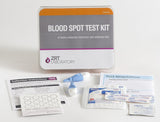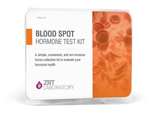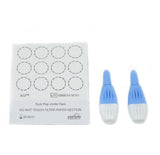The Cortisol Test Kit (C) is a cutting-edge solution designed to assess cortisol hormone levels accurately. Cortisol, commonly known as the stress hormone, plays a crucial role in the body's response to stress and helps regulate various bodily functions. This innovative kit allows individuals to conveniently monitor their cortisol levels and determine if they fall within the expected optimal range based on age and sex. By offering valuable insights into hormonal balance, the Cortisol Test Kit empowers users to take proactive steps to manage stress, optimise their health, and achieve overall well-being. With its user-friendly design and reliable results, this kit is an indispensable tool for anyone seeking to gain a deeper understanding of their body's cortisol levels and make informed decisions about their health.
Key Features of the Cortisol Test Kit:
- Accurate Test Results: Receive your test results within 3-5 working days after the laboratory receives your sample. The results will be presented in clear graphics and numerical values, providing a comprehensive view of your hormone levels.
- Expert Analysis: Benefit from the expertise of a Hormone Specialist PhD Dr. The test results will include detailed laboratory comments by the specialist, providing a professional analysis of your hormone levels and recommendations on the next steps to take.
- Convenient Sample Collection: Collect your samples from the comfort of your home and easily post them to our lab. This hassle-free process saves you time and effort, eliminating the need for clinic visits or appointments.
- Suitable for All Ages and Genders: The Cortisol Test Kit is designed to cater to both men and women, as well as children and adults. It allows individuals of all ages to monitor their cortisol levels and gain insights into their hormonal balance.
- Extended Sample Freshness: Your samples will remain fresh for up to 45 days, ensuring accurate results. The samples will be delivered to our lab within 3 to 5 working days when using the national post office service. Private carriers offer even faster delivery within 48 hours.
- Long Shelf Life: The test kit has a shelf life of 12 months from the purchase date, allowing you to use it at your convenience while ensuring reliable and accurate results.
- All-Inclusive Pricing: The test kit includes a laboratory fee, eliminating the need for additional costs or taxes related to the laboratory analysis. You can proceed with confidence, knowing that there will be no unexpected expenses.
- Customer Responsibility for Shipping: Customers are responsible for shipping their samples to the laboratory. This gives you flexibility in choosing the best shipping method for you and ensures that the samples reach the lab securely.
The Cortisol Test Kit offers convenience, accuracy, and professional analysis, empowering individuals to monitor their cortisol hormone levels and make informed decisions about their health and well-being.
Test Kit Includes Following Components:
The test kit comprises several essential components to facilitate the sample collection and return process. These components are carefully included to ensure a smooth and accurate testing experience. The test kit includes the following:
- Sample collection card: This card is specifically designed for the collection of the required sample. It is sterile and suitable for preserving the integrity of the sample during transportation.
- Two lancets: The kit includes two lancets, which are small, sterile instruments used to puncture the skin safely and effectively for blood collection. These lancets are designed to minimize discomfort during the collection process.
- Sample collection instructions: Clear and detailed instructions are provided to guide users through the process of collecting the sample accurately. These instructions ensure that the collection is performed correctly and in accordance with the testing requirements.
- Test requisition form: This form contains important information that needs to be filled out by the user. It typically includes personal details, such as name and contact information, a list of symptoms, and any additional information required for testing purposes.
- Return envelope: A pre-addressed return envelope is included in the kit. It is specifically provided for the convenient and secure return of the collected sample to the testing facility. Users can seal the envelope with the sample inside and mail it back following the provided instructions.
- Shipping Instructions: The kit also includes detailed instructions on properly packaging and shipping the collected sample back to the testing facility. These instructions ensure that the sample remains protected and arrives safely for analysis.
By including these components in the test kit, the aim is to streamline the sample collection and return process, allowing users to perform the test easily and efficiently while maintaining the integrity of the sample.
Cortisol Symptoms
Cortisol is a steroid and a stress hormone. The production of cortisol is stimulated when stress is triggered. Furthermore, Cortisol plays an essential role in the different metabolic processes in the body. Its increased distribution in stress situations can provide energy by consuming sugar, fat, and protein reserves. In addition, through immune processes, cortisol also helps with its anti-inflammatory and anti-allergic effects and has an essential function in maintaining the health of the body.
It is advisable to have your cortisol levels tested, especially if you are quickly exhausted suffer from fatigue, and generally experience unexplained health problems Or the following symptoms below:
General Cortisol Symptoms
General Cortisol Symptoms are a range of physical and psychological indicators that may occur when cortisol levels in the body are imbalanced. Here is a breakdown of these symptoms:
- Stress: Elevated cortisol levels are commonly associated with increased stress levels. Symptoms may include heightened anxiety, restlessness, and an overall feeling of being overwhelmed.
- Depression: Imbalances in cortisol can contribute to feelings of sadness, hopelessness, and a loss of interest in activities that were once enjoyable.
- Mood swings and anxiety: Fluctuating cortisol levels can lead to mood swings, irritability, and feelings of anxiety or unease.
- Exhaustion: Excessive cortisol production or chronic stress can result in persistent fatigue and a general sense of low energy levels.
- Lack of strength: Imbalanced cortisol levels may contribute to muscle weakness and a decrease in overall physical strength.
- Tiredness: Unregulated cortisol levels can lead to excessive tiredness, even after sufficient rest or sleep.
- Decreased stress resistance: When cortisol levels are out of balance, the body's ability to handle stress effectively may be compromised.
- Irritability and nervousness: Imbalances in cortisol can lead to increased irritability, restlessness, and heightened nervousness.
- Depressive moods: Cortisol dysregulation can contribute to depressive symptoms, including feelings of sadness and a loss of motivation.
- Memory issues: Elevated cortisol levels have been associated with impaired memory, difficulty concentrating, and decreased cognitive function.
- Fatigue: Chronic elevation or depletion of cortisol can result in persistent fatigue, even with adequate rest.
- Stomach ulcers and digestive problems: Imbalances in cortisol can affect the digestive system, leading to stomach ulcers, acid reflux, and other gastrointestinal issues.
- Inflammation: Elevated cortisol levels can contribute to increased inflammation in the body, leading to joint pain, swelling, and other inflammatory conditions.
- Cravings for sweet and salty foods: Cortisol imbalances may trigger cravings for sugary and salty foods, which can disrupt a balanced diet.
- Alcohol cravings: Irregular cortisol levels have been associated with increased cravings for alcohol or other substances.
- Insulin resistance: High cortisol levels can interfere with insulin function, potentially leading to insulin resistance and difficulties in blood sugar regulation.
- High blood pressure: Chronic elevation of cortisol has been linked to increased blood pressure, which can contribute to cardiovascular health issues.
- Weight gain or weight loss: Cortisol imbalances can influence appetite and metabolism, leading to weight gain or weight loss, depending on individual factors.
- Underweight: In some cases, imbalanced cortisol levels can result in unintended weight loss and difficulty maintaining healthy body weight.
- Body aches and pains: Excessive cortisol production or chronic stress can contribute to muscle and joint pain.
- Low blood pressure and dizziness: In certain cases, imbalanced cortisol levels may lead to low blood pressure, resulting in dizziness or lightheadedness.
Excessively High Cortisol Levels
Excessively high cortisol levels, often associated with chronic stress, can negatively affect the body. Here is an explanation of the symptoms that can arise from elevated cortisol levels:
- Immunodeficiencies: Prolonged exposure to high cortisol levels can suppress the immune system, making individuals more susceptible to infections and illnesses.
- Depression: Elevated cortisol levels have been linked to an increased risk of developing depression or worsening existing depressive symptoms.
- Physical exhaustion: Excessive cortisol production can lead to physical fatigue and persistent exhaustion, even after adequate rest.
- Metabolic disorders: High cortisol levels can disrupt metabolic processes, potentially leading to metabolic disorders such as impaired glucose metabolism and insulin resistance.
- Diabetes: Prolonged elevation of cortisol levels may contribute to the development of diabetes or exacerbate existing diabetes symptoms by impairing insulin function and affecting blood sugar regulation.
- Obesity and sleeping disorders: Excess cortisol can disrupt the body's metabolism and contribute to weight gain, particularly in the abdominal region. Additionally, high cortisol levels can interfere with sleep patterns, leading to sleeping disorders such as insomnia.
- Excessive hunger and cravings: Elevated cortisol levels may increase appetite and trigger cravings for high-calorie and sugary foods, potentially leading to weight gain and difficulty maintaining a healthy diet.
- Impaired cognitive function: Chronically high cortisol levels can affect cognitive function, leading to difficulties in concentration, memory issues, and decreased overall mental sharpness.
- High blood pressure: Elevated cortisol levels have been associated with increased blood pressure, which can contribute to cardiovascular health problems if left unaddressed.
- Bone density loss: Prolonged exposure to high cortisol levels can lead to decreased bone density, increasing the risk of osteoporosis and fractures.
It's important to note that symptoms of excessively high cortisol levels can vary among individuals, and not everyone will experience all of these symptoms.
Excessively Low Cortisol Levels
Excessively low cortisol levels can have significant implications on overall well-being and various bodily functions. Here is an explanation of the effects and potential causes associated with low cortisol levels:
- Cardiovascular health: Cortisol helps regulate blood pressure and cardiovascular function. Insufficient cortisol levels may lead to low blood pressure and potentially compromise cardiovascular health.
- Gastrointestinal health: Cortisol plays a role in maintaining a healthy gastrointestinal system. Low cortisol levels can impact digestion, nutrient absorption, and the overall health of the gastrointestinal tract.
- Immune system: Cortisol is involved in regulating immune system, helping suppress inflammation and modulate immune responses. Insufficient cortisol can weaken the immune system, making individuals more susceptible to infections and inflammatory conditions.
- Brain functions: Cortisol influences brain functions, including mood regulation, cognitive processes, and stress response. Low cortisol levels can contribute to mood disorders, cognitive difficulties, and an increased vulnerability to stress.
- Medical treatment: Chronically low cortisol levels often require medical intervention to restore hormonal balance. Treatment may involve hormone replacement therapy or addressing the underlying causes of cortisol deficiency.
- Infection or dysfunction of adrenal glands: Low cortisol levels can indicate an infection or dysfunction in the adrenal cortex responsible for cortisol production. Infections or disorders affecting the adrenal glands can impair cortisol synthesis and secretion.
- Adrenal fatigue: Adrenal fatigue, also known as adrenal insufficiency, is a condition characterized by reduced cortisol production due to chronic stress or other factors. It can result in persistently low cortisol levels, leading to fatigue, weakness, and other related symptoms.
- Dysfunction of the pituitary gland: The pituitary gland produces adrenocorticotropic hormone (ACTH), which stimulates the adrenal cortex to release cortisol. Dysfunction of the pituitary gland can disrupt ACTH production, leading to low cortisol levels.
It's important to note that excessively low cortisol levels can manifest differently in individuals, and not all symptoms may be present.
Cortisol and Burnout
Burnout describes the condition of prolonged, emotional exhaustion as a reaction to chronic stress – people who are affected feel "burnt out". In today's performance-orientated society, burnout is no longer a rarity. For some people, everyday work can ensure continuous stress, which, in the beginning, leads to an intensive phase of cortisol distribution. However, if this phase drags on, chronic stress can lead to the exhaustion of the adrenal cortex, causing it to produce less cortisol – leading to a cortisol deficiency. At first, only the morning cortisol levels are reduced, but the cortisol levels fall below the standard levels over time. If you are suffering from burnout, you must talk to your doctor.
However, both too low and too high cortisol levels can cause unpleasant symptoms. To avoid this, it is recommended to check your cortisol level regularly.
How does the test carry out?
This blood spot-based testing tool can be done in the privacy of your home. A simple step of collecting your blood spot for the test is required. Once you provide a blood spot, you must seal the sample and send it to us. Your test result report will be emailed to you between 3 and 5 working days after the laboratory receives your sample.
How to Use












